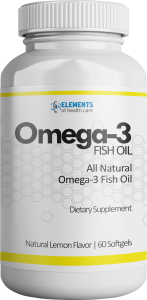Omega-3s are polyunsaturated fatty acids. Your body needs them and the only way to get them is from your diet. Omega-3s are important in many body functions, including cell growth and muscle activity. One great way to consistently include omega-3s in your life is through fish oil. And Elements of Healthcare’s Omega-3 Fish Oil is a promising choice.
There are three main types of omega-3s, two of which you will find in Elements of Healthcare’s Omega-3 Fish Oil. These are eicosapentaenoic acid (EPA) and docosahexaenoic acid (DHA). These are usually found in sources like fatty fish (like salmon, mackerel, trout, and tuna), shellfish, and krill. There is also an omega-3 called alpha-linolenic acid (ALA). You can find these in nuts, seeds, and vegetable oils.
Taking omega-3s can be important at any time in your life, and is especially helpful if you are pregnant or breastfeeding, are at risk for heart disease, or are experiencing joint pain. Omega-3s can benefit so many different areas of your life, from keeping your heart healthy to preventing the decline of mental function. Here are four areas of your life that can improve as you take fish oil:
Heart Health
Lowers Triglyceride Levels
Triglycerides are lipids (fats) found in the blood. Calories you eat but don’t need immediately are converted into triglycerides. Then your body uses them between meals to keep up your energy. But when these triglycerides aren’t used, they can cause buildup in your blood vessels and arteries. This increases blood pressure and can lead to clots that cause heart attack and stroke. Research is in agreement that omega-3s help reduce triglyceride levels.
Omega-3s also help your heart by being an antioxidant and an anti-inflammatory. Research has linked consistent omega-3 intake with lower risk of heart disease, heart attacks, and strokes.
Lowers Blood Pressure in Hypertension Patients
Several studies have shown that omega-3s can lower blood pressure. One research review analyzed 70 randomized control trials, and concluded that EPA + DHA fatty acids did in fact lower blood pressure. This review and other research indicates that omega-3s lowers blood pressure more effectively in those who already have high blood pressure. Those within a normal blood pressure range did not see a significant drop. This is actually positive news. People with high blood pressure can see a healthy drop, and those within a normal or lower range can consume omega-3s without worrying it will lower their blood pressure too much.
If you are already taking blood pressure medication, talk with your doctor before taking Elements of Healthcare Omega-3 Fish Oil as a supplement.
May Help Maintain Healthy Cholesterol
Omega-3s are a good source of HDL cholesterol, which is the healthy or “good” cholesterol. It is found in fatty fish, nuts, and vegetable oils. While some research shows that omega-3s can help maintain healthy cholesterol levels, other research shows that fish oil can raise LDL cholesterol slightly.
Brain Health
Protects Brain Health
Many people take omega-3 supplements for their cognitive health. This can be especially important as you age and brain function begins to decline. Aging is associated with low levels of DHA omega-3s. Research has also linked fish consumption with a decreased risk of dementia and Alzheimer’s disease.
Omega-3s help make up brain cell membranes (as well as cell membranes throughout the body). These are important in cell communication – the healthier the cell membrane, the better the communication.
Your brain needs oxygen. In fact, it uses 20% of your oxygen intake. But oxidative stress over time has its consequences. This process leads to mental decline as we age. Omega-3 is an antioxidant and can help slow that process. It is also an anti-inflammatory. There is encouraging evidence that a healthy intake of omega-3s do in fact help cognitive function.
Essential in Infant and Child Development
 Women who are pregnant or breastfeeding are strongly encouraged to take omega-3s for their child’s proper development. As the fetus grows, it is completely dependent on the mother for all essential nutrients. This includes a healthy supply of fatty acids, which it needs for important brain development. Studies have shown that DHA-supplemented infants have better mental and psycho-motor development scores (breast-fed children scoring even higher).
Women who are pregnant or breastfeeding are strongly encouraged to take omega-3s for their child’s proper development. As the fetus grows, it is completely dependent on the mother for all essential nutrients. This includes a healthy supply of fatty acids, which it needs for important brain development. Studies have shown that DHA-supplemented infants have better mental and psycho-motor development scores (breast-fed children scoring even higher).
Other studies have linked low maternal DHA intake with increased risk of poor child brain development. These also show that increased DHA intake decreases that risk and is important before and after birth. A mother’s omega-3 intake can have short and long-term effects on the child. Needed intake will vary from person to person, depending on their fatty acid metabolism. Work with your doctor to understand what amount is right for you.
May Promote Healthy Cortisol Levels
Cortisol is a stress hormone. It’s responsible for your “fight or flight” response. During that process it increases the glucose in your blood, stimulates the breakdown of proteins, and raises blood pressure. This keeps us on our toes and alert during stressful situations, but too much cortisol can cause damage, especially in the brain. Omega-6/omega-3 Essential Fatty Acid Ratio: The Scientific Evidence states that as cortisol increases, learning and memory decrease. Free essential fatty acids are able to reduce cholesterol levels in the brain cell membranes. This helps prevent the negative effects and protect the brain from cognitive degeneration.
Joint Health
Reduces Inflammation in Joints

Rheumatoid arthritis happens when there is chronic inflammation in the joints. A lot of joint pain is caused this way. It makes sense, then, that an anti-inflammatory like omega-3 could help ease that pain.
An article Arthritis & Rheumatology showed how omega-3s reduced joint inflammation and pain. had 90 patients participate in a double-blind, randomized study for one year. They were divided into three groups: the first group took a daily supplement of 2.6 grams of omega-3, the second 1.3 g of omega-3 plus 3 g of olive oil, and the third took 6 g of olive oil. Only the group taking the 2.6 g of omega-3 showed significant improvement. In fact, they even stated that the omega-3 might reduce the need for certain arthritis medications.
Another review looked at 17 randomized, controlled trials and assessed the effect of omega-3 on joint pain. They measured success by looking at patient-assed pain, physician assed pain, duration of morning stiffness, number of painful or tender joints, the Ritchie arthritis index, and NSAID consumption (an NSAID is a non-steroidal anti-inflammatory drug, such as ibuprofen). Their results showed that omega-3 fatty acids are a promising treatment for joint pain and rheumatoid arthritis.
Gut Health
Reduces Inflammation in Gut
Again, omega-3 is a powerful anti-inflammatory. This can help gut health as well as the brain, joints, and heart. One study examined different groups taking fish oil, olive oil, or a combination of both. Results showed that fish oil and olive oil together are a powerful combo, and did the most to reduce gut inflammation. If you suffer from intestinal pain, include olive oil in your diet as you take Elements of Healthcare Omega-3 Fish Oil.
Promotes Healthy Gut Bacteria
Omega-3s may also help keep your gut bacteria healthy. In recent years, researchers have focused on how your gut bacteria affect your overall health. We may be used to thinking of bacteria as a bad thing, but the bacteria in our gut are important in digestion, the immune system, and weight management. Recent studies have also shown that omega-3 can help keep our gut microbiology diverse, which is important in preventing diseases and conditions like Irritable Bowel Syndrome (IBS).
Fish Oil Risks
Fish oil should not be taken by those with a seafood allergy. If you have an allergy or would prefer a vegan/vegetarian option, consider foods or supplements with ALA omega-3s.
Fish oil is also a blood-thinner. Do not take if you are on a blood-thinning medication.
Elements of Healthcare Omega-3 Fish Oil
 What makes Elements of Healthcare Omega 3 Fish Oil any different or better than other supplements? This supplement
What makes Elements of Healthcare Omega 3 Fish Oil any different or better than other supplements? This supplement
- Is affordable
- Contains 1,2000 mg of fish oil per serving (with 30 servings per bottle)
- Is easy to swallow
- Has a lemon flavor and no fishy after taste
Why wait to improve your quality of life? There are so many benefits to consuming omega-3s. So whether you want to relieve aching joints, improve your gut health, or lower your blood pressure, fish oil has something for you. Learn more about how fish oil can help you here.


